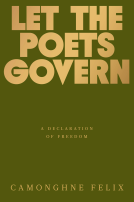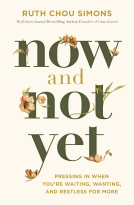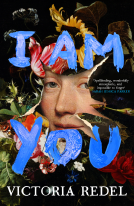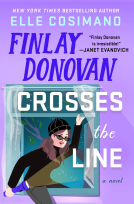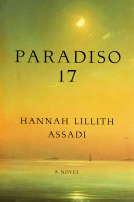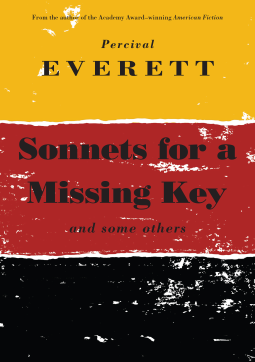
Sonnets for a Missing Key
and some others
by Percival Everett
This title was previously available on NetGalley and is now archived.
Send NetGalley books directly to your Kindle or Kindle app
1
To read on a Kindle or Kindle app, please add kindle@netgalley.com as an approved email address to receive files in your Amazon account. Click here for step-by-step instructions.
2
Also find your Kindle email address within your Amazon account, and enter it here.
Pub Date Aug 20 2024 | Archive Date Jan 13 2025
Talking about this book? Use #SonnetsforaMissingKey #NetGalley. More hashtag tips!
Description
AUTHOR OF THE PULITZER PRIZE AND NATIONAL BOOK AWARD WINNER, JAMES
AUTHOR OF ERASURE, now adapted for the screen as the OSCAR-WINNING FILM, AMERICAN FICTION
Percival Everett is diving back into poetry with his spellbinding new collection, SONNETS FOR A MISSING KEY
“Few writers pay more rapt attention to the fact that history is, fundamentally, storytelling. … A pebble in every shoe. It’s the Everett way.”—New York Times
Inspired by the Preludes of Chopin and the piano solos of Art Tatum, these sonnets leap and turn through philosophical musings accrued across a life well lived, with inventive language, crystalline imagery, and turns of phrase that lift off the page and glimmer. Everett’s sonnets soar through the musical scale, from A Minor to A Major, exploring relationships, spirituality, compassion, despair, and how the stories we tell ourselves shape our realities.
Everett continuously defies convention with every creative expression and brings his literary audacity back to his poetic roots with this, his sixth collection with Red Hen Press.
Sonnets for a Missing Key is a mesmerizing feat of language that reinforces Percival Everett as one of the great wordsmiths of the century.
Advance Praise
"Wry and epigrammatic, these poems inventively challenge and expand the possibilities of form."—Publishers Weekly
“Percival Everett is a genre.”—Kiese Laymon, author of the author of Long Division and MacArthur Fellow
"I feel very deeply that he is one of the most profoundly talented writers of all time." —Robin Coste Lewis, author of Voyage of the Sable Venus and National Book Award for Poetry Winner
"Percival Everett’s body of work has been called many things—experimental, idiosyncratic, ‘gleefully unhinged’—and perhaps most frequently, prolific." —Lisa Tolin, Editorial Director at PEN America
Available Editions
| EDITION | Other Format |
| ISBN | 9781636281667 |
| PRICE | $16.95 (USD) |
| PAGES | 64 |
Available on NetGalley
Average rating from 53 members
Featured Reviews
 Piper P, Reviewer
Piper P, Reviewer
Percival Everett's Sonnets for a Missing Key is a masterful collection that defies conventional poetic structures while delving deeply into themes of loss, identity, and the relentless search for meaning. Known for his versatility and intellectual rigor, Everett brings a refreshing and thought-provoking approach to the sonnet form in this unique and compelling work.
Structure and Style
Everett's sonnets are not confined by the traditional 14-line structure. Instead, he uses the sonnet form as a canvas to experiment with language and form. This innovative approach allows for a more flexible and dynamic exploration of his themes. The poems are rich with intertextual references, blending classical and contemporary allusions seamlessly. His command over language is evident in the way he plays with words, creating layers of meaning that invite readers to engage with the text on multiple levels.
Themes and Motifs
At its core, Sonnets for a Missing Key is a meditation on absence and the human condition. The titular "missing key" serves as a metaphor for various forms of loss—emotional, spiritual, and existential. Everett explores the idea of searching for something elusive, whether it be understanding, closure, or a sense of self. The recurring motifs of doors, locks, and keys are employed with precision, symbolizing barriers and the potential for unlocking hidden truths.
One of the standout aspects of this collection is Everett's ability to intertwine personal and universal experiences. His sonnets capture moments of introspection and vulnerability, resonating with readers on an emotional level. The poems also reflect on broader social and cultural issues, offering poignant commentary on the human experience.
Highlights
Several sonnets in this collection stand out for their lyrical beauty and emotional depth. One particularly moving piece is "Sonnet for the Absent," which poignantly captures the longing and emptiness that accompanies loss. Everett's use of imagery is striking, evoking a sense of both despair and hope.
Another highlight is "Sonnet of the Search," where Everett's wordplay and rhythmic flow create a mesmerizing effect. The poem's exploration of the journey towards self-discovery is both profound and relatable, making it a standout piece in the collection.
Conclusion
Sonnets for a Missing Key is a testament to Percival Everett's prowess as a poet and his ability to push the boundaries of literary form. This collection is a thought-provoking and emotionally resonant work that will linger in the minds of readers long after they have turned the final page. Everett's innovative approach to the sonnet form, combined with his exploration of timeless themes, makes this book a must-read for poetry enthusiasts and anyone seeking a deeper understanding of the human experience.
 Reviewer 1394760
Reviewer 1394760
This might be your first Everett.
This might be your first sonnet book.
This might be your first poetry book (probably not).
I highly recommend this book due to Everett’s mastery of words and themes.
First of all, I normalise not fully understanding, grasping a piece of art/fiction, and still enjoying the thoughts, feelings, emotions, sensations it leaves you with.
Second of all, especially the first part (the part before the section called ‘Other Modes’) is dealing with themes of loss, missing and they will speak to readers easily.
I am not qualified to assess the structure of the sonnets and the references to Chopin’s preludes, but Everett is one of my favourite writers and one of the reasons why is his way of creating rhythms and his playing with words. If someone told me that I’d be spending a couple of hours of my 2024 summer reading a new Everett, I would have told them that they’re giving me a couple of dream hours. And so it was.
I am planning to do readings on sonnets and the Preludes and read this book, especially the second part again. Even without the Chopin layer, I enjoyed the interlink between the keys and these sonnets.
 Jeff R, Educator
Jeff R, Educator
A great little collection of poems. I had to read it twice (which is not difficult due to its size) to get what Everett was doing here. I'm a huge fan of Percival Everett's. His novels are all so unique -compared to other novels and within his own bibliography - so I was curious about this poetry. I feel I'll likely read and re-read this one a number of times as I'm certain I missed more in my first two readings than I actually 'got'.
An Unsophisticate at the Tasting Table
Percival Everett is remarkable. I have been treated to a number of his works in the past few years, including the brilliant “James,” “The Trees,” and “Erasure.” His wit, insight, and humor just serve to delight.
Sonnets? I am totally unqualified to judge this collection. I have been exposed to very little poetry, let alone sonnets. I feel like an amateur at a vintage wine tasting event. These pieces were paired with the works of Chopin and Art Tatum– um, okay (?)
What I was able to do was savor bits and pieces of these works. I had to slow down, reread most of these more than once, not rush. So many quick ideas and musings hit home… and then vanished.
Some of my favorites:
“We climbed at the language , the idea that one climbs down. With a little practice, you said, we could, if we wanted, fall up.”
“When you told me you were sick I didn’t believe you and then of course, of course I did. When they told me you were dead I didn’t believe them, and I didn’t and I didn’t and I didn’t I did when you told me. When you told me you were dead I believed you. Even then I had my doubts.”
And, addressing my viewpoint…
“I wanted to see it. I wanted to be free enough to see it…I wanted to be that smart, that free.”
I enjoyed these rich creations, as much as anyone who is intimidated by the art form.
Thank you to Red Hen Press and NetGalley for providing an advance reader copy in exchange for an honest review. #SonnetsforaMissingKey #NetGalley
This book of poetry is ekphrasis at its finest! The collection is short, efficient, and structured like the art forms that inspired it: Italian sonnets, Art Tatum's jazz piano solos, and Chopin's famous Preludes. The slim 62-page book contains 47 poems. No poem is longer than a page. The first half of the book is sonnets, specifically Petrarchan sonnets. The second half is short couplet-based poems that end up forming quintets or sestets. All of the poems tie in with one of Chopin’s 24 preludes via their title. Like Chopin's Preludes, the poems are a little discordant—touching on really sad stuff then switching up quickly to something that feels more playful and high energy.
I like the second half of the collection a lot. The poems read like jazz, and I think this is the section that is mostly closely linked to Art Tatum’s piano solos. The quintets and sestets are very stream of consciousness and fast paced. They have nice repetition and are pretty to read out loud.
One of the most surprising things about this collection was the repeated allusions to Lewis Carroll's Through the Looking Glass. I delighted in these unexpected references. Everett always has a surprise up his sleeve.
Thanks Red Hen Press and NetGalley for the gifted DRC book.
I finished reading SONNETS FOR A MISSING KEY and immediately read it a second time. I find it difficult to write about poetry. I enjoyed this collection as it moved from sonnets to pieces of different structure. There were some very memorable lines. At some point, I’d love to devote time to studying poetry in an academic sense. For now, I have to stick with these simple thoughts.
 Reviewer 896072
Reviewer 896072
It's Percival Everett. Just read it. You won't regret it. And if you listen, you might hear Chopin in the words.
 Christopher P, Media/Journalist
Christopher P, Media/Journalist
Truly breathtaking poems that really reflect Everett's talent. While his book James, is still, in my opinion, the best work I have read this year, and probably decade, (and a novel I re-read before reading this just to take notes on that masterpiece) Sonnets for a Missing Key does not need to live up to his magnum opus (or his other magnum opus Erasure) since it is different. And for what it offers, in the form of poignant and hard hitting poems, it delivers on. Hard. Feeling more like a passion project than any of his previous writing, here, Everett's entire collection of poems flow together, to not give anything away, like music to the ear in book form. In other words, gracefully and all well-connected. Something I hate when I read a collection of poems is when it feels like they were randomly chosen and don't work altogether. To me, it is something that plagues collections of poems. Gratefully, Everett makes his poems so precise in their well-chosen nature that make it, to me, worth an extra re-read in truly being able to not just dissect each on their own, but together as a work of art and looking back as to how it all flows together. Another issue I have, this time with poems on their own, is how simplistic sometimes they can be. I am a fan of short and to the point poems, yes, but I also find so many poems overly simplistic that leave the power of it to the lingering imagination of it's reader rather than providing much substance. Gratefully, again, Everett delivers on providing either direct poems that hit with their straightforward and raw prose or either simple and fundamental to the collection that fit in the line of "less is better". As a whole, a worthwhile read.
I really enjoyed *Sonnets for a Missing Key*. The language is so inventive, and the way Everett weaves in musical influences from Chopin and Art Tatum makes the collection feel dynamic. I found myself reading it twice, and I’m sure I missed a lot that I'll catch on future re-reads. The sonnets explore some deep themes—relationships, spirituality, and the stories we tell ourselves—while still being accessible. This is one of those collections I can see myself coming back to again and again to uncover more layers.
(Highly recommend Chopin playing in the background while you read)
 Reviewer 1479430
Reviewer 1479430
short, sweet, and stunningly beautiful. percival everett has a true talent for conveying deep emotion and profound human experiences in just a few words.
thank you netgalley for the e-arc.
 TIYASHA G, Reviewer
TIYASHA G, Reviewer
Wow! Absolutely loved the poetry collection. It is quite heart touching and something that I have read after ages. Absolutely recommend and not a surprise given Percival's past work.
Thank you Red Hen Press and NetGalley for this e-arc in exchange of my unbiased review.
Readers who liked this book also liked:
Elle Cosimano
General Fiction (Adult), Mystery & Thrillers




